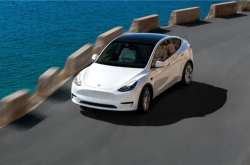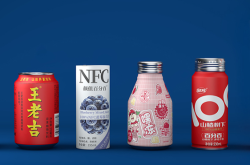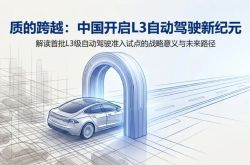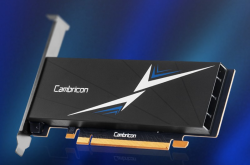Up to 38%, the EU brashly wields the big stick of additional tariffs
![]() 06/13 2024
06/13 2024
![]() 535
535
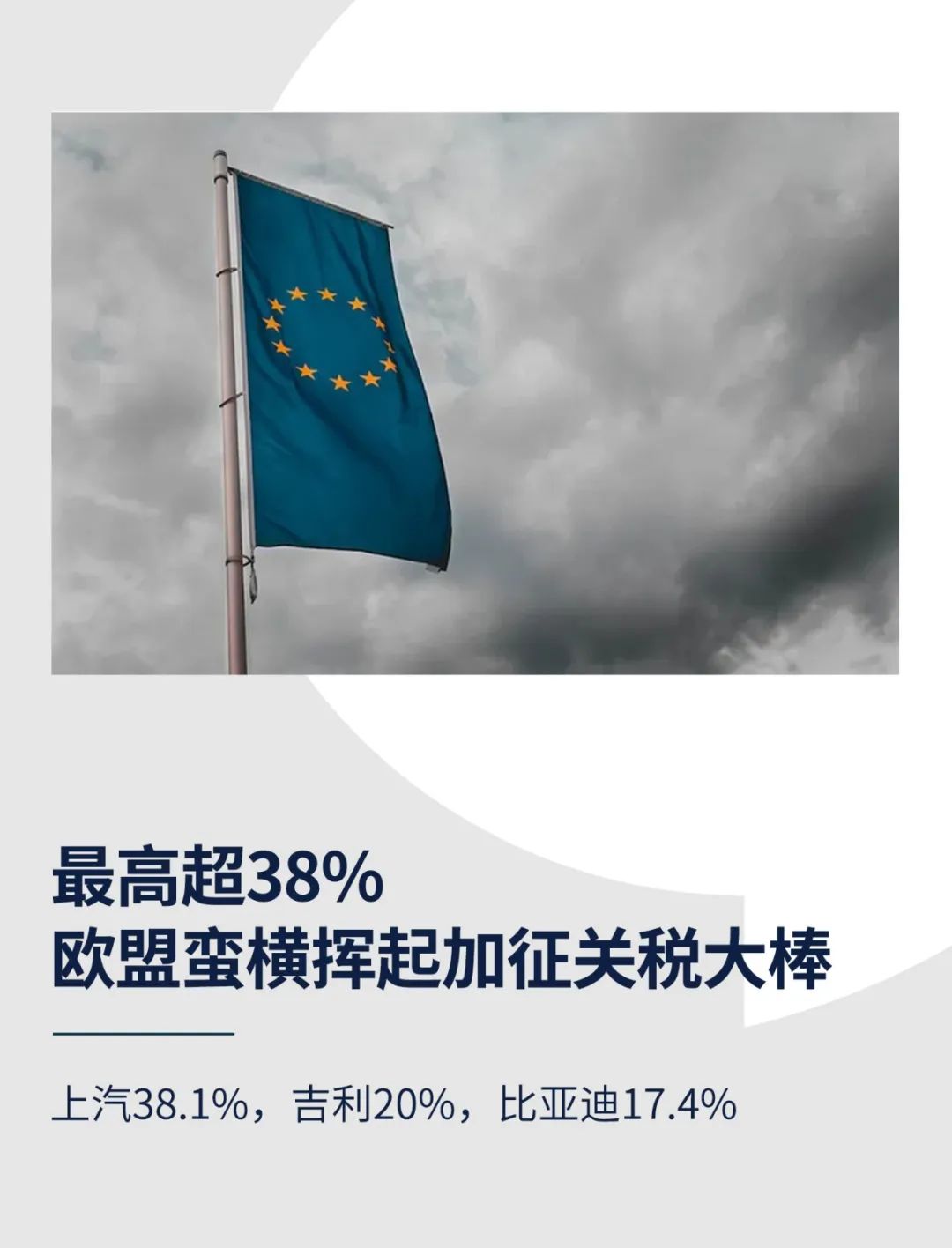
Compiled by | Yang Yuke
Edited by | Ge Bangning
Produced by | Bangning Studio (gbngzs)
Never before have I seen a tariff increase policy that has received such strong opposition from domestic enterprises.
On June 12, 2024, the European Commission issued a statement proposing to impose temporary countervailing duties of up to 38.1% on electric vehicles imported from China starting from July 4. Based on this standard, it will collect tariffs of over 2 billion euros annually, potentially triggering a trade war with China.
According to World Trade Organization (WTO) regulations, China has four weeks to challenge the evidence provided by the EU for imposing tariffs on electric vehicles. If China fails to provide a convincing and effective solution to correct its unfair trade practices, the tariff measures will be implemented in early July.
The EU will impose tariffs at five levels. Among them, Chinese pure electric vehicle manufacturers that cooperate with the EU investigation but are not individually sampled will be subject to a weighted average tax of 21%, while electric vehicle manufacturers that do not cooperate with the investigation will be subject to a tariff of 38.1%. Specifically, SAIC Motor Corporation is subject to 38.1%, Geely Automobile is 20%, and BYD is 17.4%.
Tesla, which cooperates with the EU, may initially be subject to a tariff of 21%. The EU stated that after assessing the evidence submitted by Tesla, it may revise this rate to a separately calculated EU rate next month.
These rates are imposed in addition to the existing 10% import tariff. This move indicates that the findings of the European Commission's investigation are quite destructive.
The EU wrote in a statement: "The preliminary results of the EU's countervailing investigation show that the entire electric vehicle value chain benefits from subsidies in China. Therefore, subsidized Chinese imported products flood into the EU industry at artificially low prices, posing a significant, foreseeable, and imminent threat of damage."
Margaritis Schinas, Vice President of the European Commission, believes that the preliminary investigation results show that Chinese automobile production benefits from "unfair subsidies, posing a threat of economic damage to EU battery electric vehicle manufacturers." The EU has "contacted relevant Chinese departments to discuss these findings and possible ways to resolve the issues."
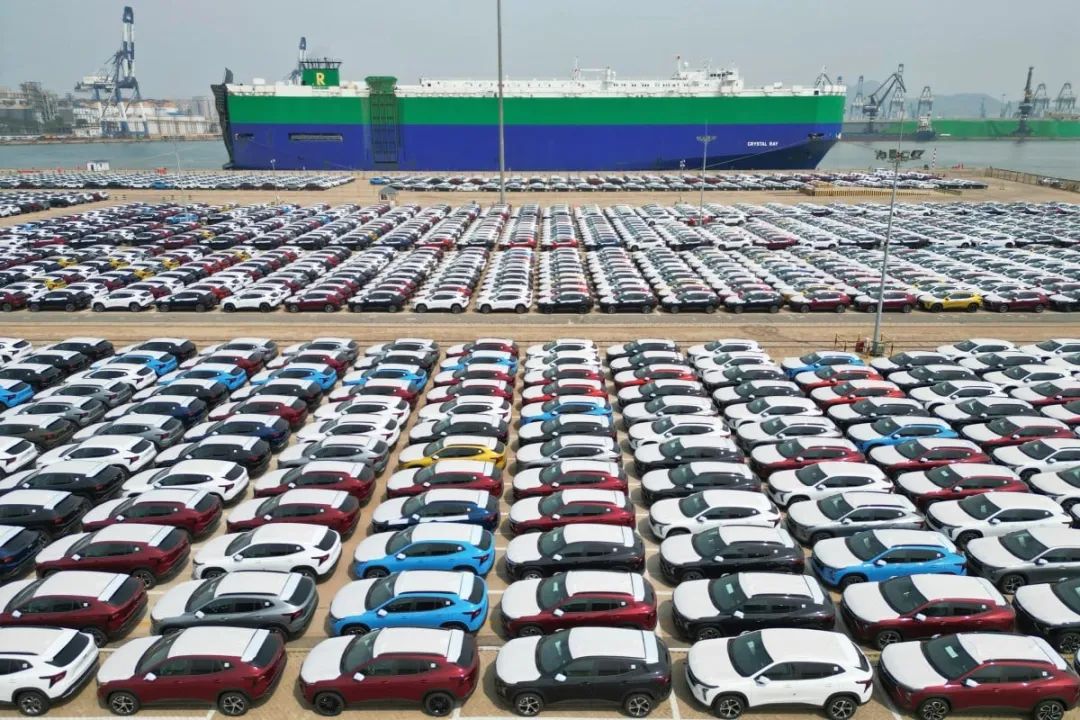
On the same day, Chinese Foreign Ministry spokesperson Lin Jian said that this countervailing investigation is a typical case of protectionism. "We urge the EU to abide by its commitment to supporting free trade and opposing protectionism, and jointly maintain the overall situation of China-EU economic and trade cooperation with China. China will take all necessary measures to resolutely safeguard its legitimate rights and interests."
Lin Jian said that many politicians and industry representatives from European countries have expressed opposition to Brussels on the issue of tariffs, stating that "protectionism has no future, and openness and cooperation are the right path."
Bloomberg reported that if the new tariffs take effect, European manufacturers may face retaliation, as China is prepared to impose tariffs of up to 25% on imports of large-displacement engine vehicles. Among them, Toyota Motor, Mercedes-Benz, and BMW Group are the most affected.
Most of the cars imported into China are luxury cars. If new tariffs are implemented, large-displacement engine models including the Mercedes-Benz GLE and S-Class sedans, as well as the Porsche Cayenne, may be affected.
Lexus, Toyota's premium brand, topped the import rankings last year with 180,000 sales, accounting for more than a fifth of total sales. If Beijing decides to implement tariffs in all countries, this Japanese company may be implicated in trade disputes with the EU and the US.
In addition to retaliating against automobile trade, China may also impose tariffs on European wines and dairy products and investigate European exports of cognac.
It is worth noting that imposing higher import tariffs on Chinese automakers such as BYD and Geely Automobile will also hit some Western companies, including Tesla, BMW Group, Mercedes-Benz, and Renault Group.
Tesla ships the Model 3 from Shanghai to Europe, and the BMW Group exports the locally produced iX3 and Mini brands. Mercedes-Benz produces Smart sedans in China, and Renault Group's Dacia Spring electric microcar is also produced in China.
In response, Mercedes-Benz, BMW Group, and Volkswagen Group have all expressed their positions.
Oliver Zipse, Chairman of the BMW Group, believes that the European Commission's proposed imposition of tariffs on Chinese electric vehicles is a wrong decision. Imposing tariffs will hinder the development of European automakers and also harm Europe's own interests.
He believes that for the BMW Group, protectionist measures such as increasing import tariffs cannot help companies enhance their global competitiveness. The BMW Group unwaveringly supports free trade.
Mercedes-Benz stated that it has always supported free trade based on WTO rules, including the principle that all market participants should enjoy equal treatment. "We will closely monitor the situation."
Volkswagen Group has categorically opposed this decision of the European Commission, believing that in the long run, imposing countervailing duties is not conducive to enhancing the competitiveness of the European automobile industry, and the timing of the European Commission's decision is not appropriate. As a global enterprise, Volkswagen Group supports and advocates an open, rules-based trade policy.
As the EU imposes tariffs, European automakers are facing challenges from Chinese competitors' electric vehicles. The EU has conducted an eight-month investigation into whether Chinese automakers have received unfair government subsidies.
In May this year, the Biden administration quadrupled China's import tariffs on electric vehicles to 100%.
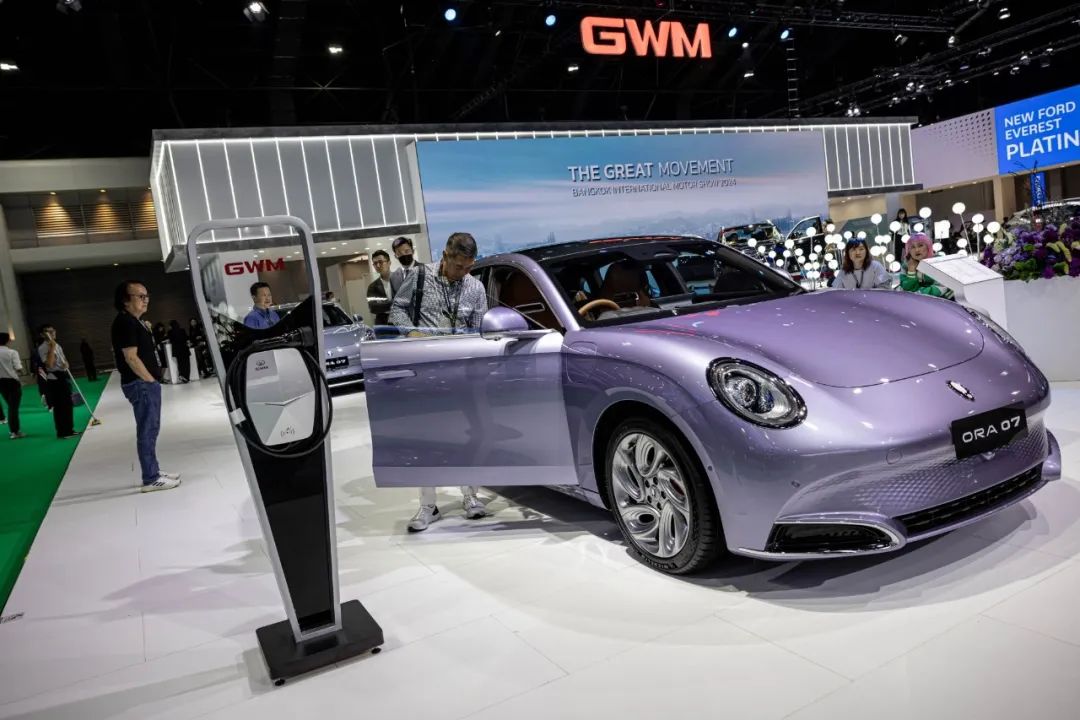
Great Wall Cancels Plant Construction Plan
Some Chinese automakers have scaled back their investments in Europe.
Great Wall Motor announced last week that it would close its European headquarters in Munich, southern Germany. This decision has sparked speculation about China's competitiveness in the European automotive market—whether the cancellation is part of Beijing's retaliation against possible EU tariffs or purely due to economic reasons.
Felipe Munoz, a senior analyst at JATO Dynamics, a London-based automotive research company, wrote in a research report: "Despite much speculation surrounding the entry of Chinese automotive brands into Europe, Chinese cars remain somewhat rare to some extent—as evidenced by the slow rise in registrations over the past year."
Munoz told Deutsche Welle that not all Chinese brands expanding in Europe will succeed, as Europe is a "very difficult market." "Europeans don't know these brands and need to work hard to change people's impression of low-quality products made in China, which takes time, and it's a long time."
The Financial Times reported that in the first four months of this year, sales of Chinese electric vehicles in Europe grew by 23%. Analysts believe that even so, European automakers still have multiple advantages over their Chinese competitors for some time to come.
Ferdinand Dudenhöffer, the founder of Ferdinand Research and a former automotive research center director, told Deutsche Welle: "Chinese companies have great cars, but they lack experience in marketing." He said that Great Wall Motor had hoped to use existing dealers of competitors to sell cars to European consumers, but this was a "wrong approach."
For Great Wall Motor, closing the Munich headquarters is a significant turnaround. Previously, the company had sought to establish factories in Europe as part of its ambitious expansion plan on the continent.
Last month, Great Wall Motor pledged to sell 1 million vehicles overseas by 2030, up from 316,000 last year. It insists that it has no plans to exit the European market, and its European operations will be managed by its Chinese headquarters.
Coincidentally, just before Great Wall Motor announced this news, two Chinese battery manufacturers decided to abandon new factories in Germany. Hive Energy said it would no longer build a battery factory in the eastern German state of Brandenburg, blaming the cancellation of a large customer order.
"There may be political reasons behind this decision. Beijing is not satisfied with the prospect of EU tariffs, and we can expect retaliatory measures," Munoz told Deutsche Welle.
In December last year, Contemporary Amperex Technology Limited (CATL) also stopped plans to expand its first overseas battery factory in the eastern German state of Thuringia due to declining demand, but the battery manufacturer is building a second factory in Hungary.
Chinese electric vehicle manufacturers and battery producers are affected by the slowdown in demand for electric vehicles in Europe. Government subsidies are being phased out, and European consumers remain vigilant about the many shortcomings of electric vehicles, including battery range anxiety and low resale value.
Munoz said: "Electric vehicles still rely heavily on government incentives. We haven't reached that level yet, and even electric vehicles worth 20,000 euros (equivalent to 21,000 US dollars) are not affordable cars."
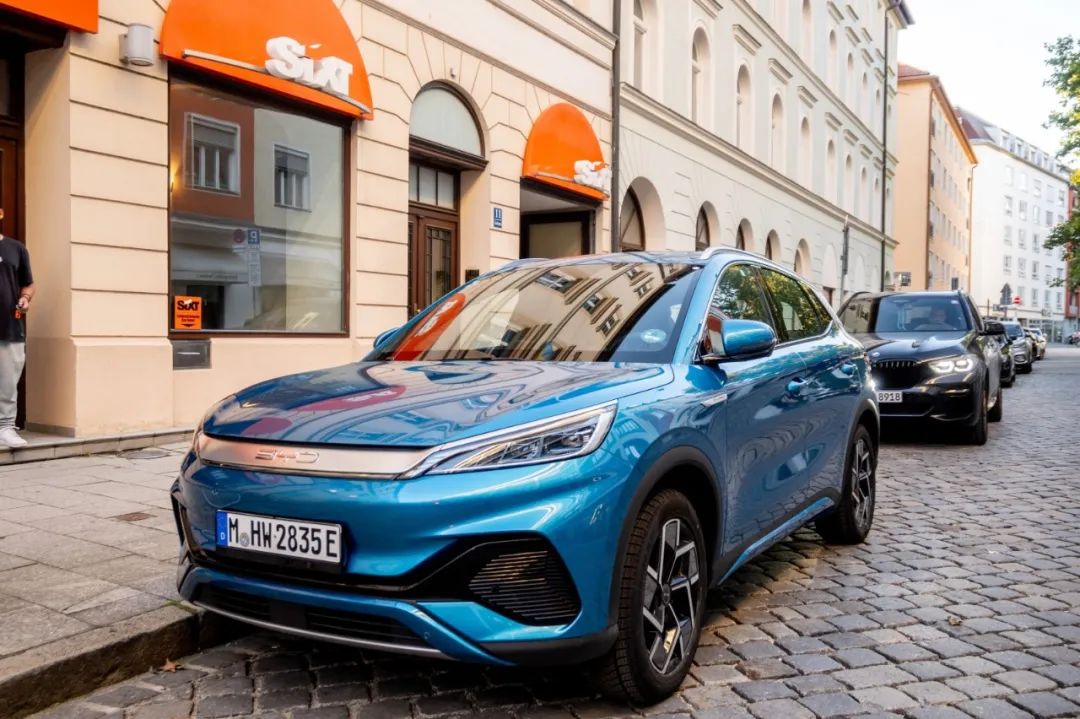
Germany to the Left, France to the Right
The additional tariffs aim to increase the selling prices of pure electric vehicles made in China in the EU, bringing their final prices closer to European competitors, with the ultimate goal of "ensuring fair competition." However, the extent to which the gap will narrow remains to be seen.
It is very clear—Brussels' resistance to China is controversial. The strongest opponents include Europe's largest automakers. China is a huge and lucrative market, and they rely heavily on it. This dependence complicates Europe's efforts to follow the US in raising barriers to Chinese imports.
If negotiations with China fail to reach a solution immediately, these tariffs will come into effect on July 4, but they can only be imposed after member states approve a decision to extend the tariffs into the fall. Some national officials, including those from Germany, Sweden, and Hungary, have criticized efforts to impose tariffs, but the threshold for blocking tariffs in the fall is also high.
Now, all eyes are on Germany.
The German Association of the Automotive Industry (VDA), supported by automakers such as BMW Group, Mercedes-Benz, and Volkswagen Group, has clearly expressed opposition to additional tariffs, believing that they would "not be suitable for strengthening the competitiveness of the European automotive industry" and may trigger "significant trade conflicts."
Industry pressure, coupled with disagreements within the three-party coalition led by German Chancellor Olaf Scholz, will lead Berlin to vote against tariffs in November.
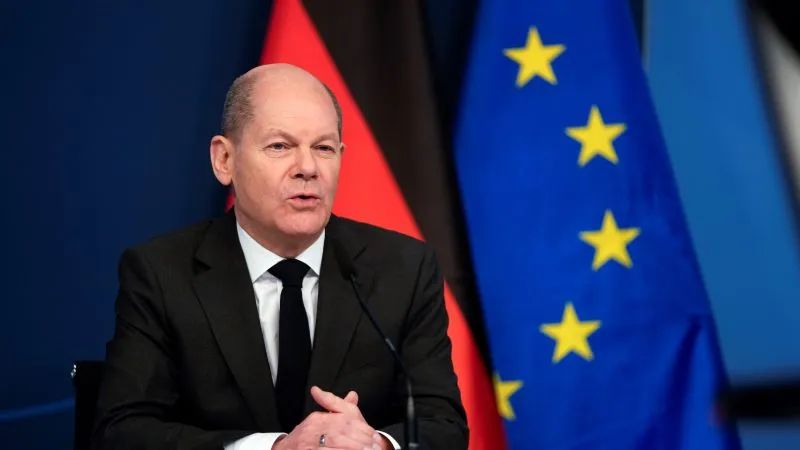
Hungary, which has attracted investment from BYD, is also considered an inevitable opponent. Other open-minded countries, such as Sweden and Ireland, have reservations and have not explicitly opposed tariffs.
On the other side of the debate, France is widely regarded as a major supporter of this investigation. French automakers have a smaller exposure to the Chinese market. Italy recently expressed support for this initiative and called on the EU to follow the US, which announced a 100% tariff on electric vehicles made in China.
Industry economists believe that what is at stake is not just the future of the automotive industry. This outcome may determine whether and to what extent Beijing's industrial offensive reshapes the Western economy. Some people refer to this offensive as the second Chinese shock after China's conquest of the consumer goods manufacturing industry early this century.
Gregor Sebastian, a senior analyst at Rhodium Group, a think tank, believes: "China is trying to play a divide-and-conquer game. For countries like Germany and France, China is using a big stick to hit automobile exports and agricultural products. For countries like Spain, Italy, and Hungary, the carrot is the promise of more investment in electric vehicles."
Volkswagen Group also opposes imposing tariffs. Although the German automaker is facing increasingly fierce competition from a new generation of Chinese electric vehicle manufacturers, these manufacturers are challenging the dominance of Western manufacturers in China and overseas.
Looking at Volkswagen Group's massive electric vehicle production base in Hefei, China, to some extent explains its position. Hefei, known as China's Silicon Valley, is where over 1,000 robots are busy assembling a sporty pure electric SUV locally produced by Volkswagen Group for export to Europe.
This factory is one of the most efficient in the world for Volkswagen Group. Company officials said it helps the company significantly shorten the time required to produce a car from design to large-scale market production, which Volkswagen Group refers to as "China speed."
As this factory demonstrates, Volkswagen Group is already closely connected with China—not only as a source of 33% of the group's sales but also as a production base for exports.
German automakers like Volkswagen Group oppose the imposition of import tariffs on Chinese electric vehicles in Europe because maintaining access to the Chinese market is more important. Some German suppliers also welcome the rise of Chinese automakers, who have now become their customers.
"We advocate fair and open trade and do not want to take additional protectionist measures," said Ralf Brandstätter, CEO of Volkswagen Group China, in a recent interview. "We must adapt to this new situation, not set up new obstacles."
Germany is the largest automotive market and the largest producer of automobiles and components in the EU. As the largest economy in the EU, its support can often make or break EU initiatives. Berlin, which has been lobbying Brussels against tariffs, is also an ally of China's efforts to reduce tariffs on electric vehicles.
In April this year, German Chancellor Olaf Scholz led a large business delegation on a three-day visit to China.
Last month, another official visit to China by Germany received less attention but provided a more vivid example of the joint efforts of German automakers and politicians to promote good relations with China.
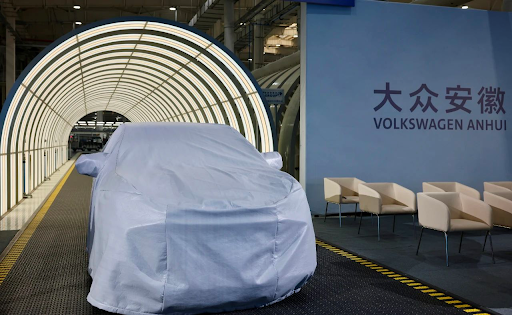
Lower Saxony, one of the largest shareholders of Volkswagen Group, led a delegation to Hefei, the location of Volkswagen Group's ultra-modern factory. The message it conveyed was that Germany will not decouple from China.
During the visit, Lower Saxony State Premier Stephan Weil told the Wall Street Journal: "There are many unsettled turbulent times between Europe and China, the US and China... We must maintain dialogue with each other."
One of the topics during Weil's visit was discussing a new investment with China COSCO Shipping Corporation in the German port of Wilhelmshaven, which is home to Germany's largest naval base.
The EU's trade deficit with China last year was 291 billion euros, equivalent to 313 billion US dollars, making the EU's position towards China even stronger. In addition to tariffs on electric vehicles, the European Commission is also investigating subsidies provided by Chinese companies in industries ranging from clean energy to safety equipment.
Some member states fear this may provoke retaliation. Scholz recently said: "We should not forget that European manufacturers and some US manufacturers have achieved success in the Chinese market, and they have also sold many European-made cars to China."
Recently, during a visit to Spanish government officials and the Chery Barcelona plant, Chinese Minister of Commerce Wang Wentao urged the Spanish government to lobby Brussels against the upcoming tariffs. Last week, Wang Wentao held meetings in Greece, Poland, and Portugal, all countries where China has made significant investments.
Later this week, during a visit to Spanish automotive supplier Gestamp, Jordi Hereu, Spain's Minister of Industry, expressed doubts about the tariffs planned by the EU and called on Brussels to provide assistance to help the development of the country's key industries.
"I don't believe in trade wars because I believe in international trade

